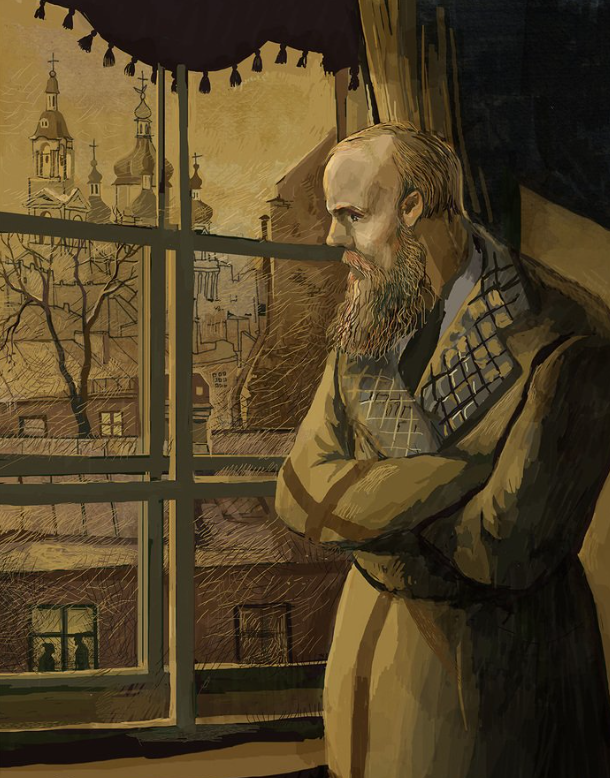
13.01.2023
In Europe, F. M. Dostoevsky became a famous writer even before the publication of translations of his famous novels.
In May 1879, the writer was invited to the International Literary Congress in London, where he was elected a member of the honorary committee of the International Literary Association. In a notice of this event sent to Dostoevsky from London, the Russian writer was called one of “the most illustrious representatives of modern literature”.
One of the first publications of Dostoevsky’s works in a foreign language was the German translation by Wilhelm Wolfsohn (1820-1865) of excerpts from the novel “Poor People”, published in the magazine Sankt-Petersburgische Zeitung in 1846-1847. Most often, the novels of the Great Pentateuch were translated and published in German.
From the point of view of F. Kafka, Dostoevsky is one of the four “with whom he (Kafka) felt a spiritual kinship.” From “Letters to Felicia” (letter dated 02.09.1913, translated by Rudnitsky): “Judge for yourself: of the four people with whom I (without putting myself next to them either in strength or in the power of coverage) feel blood kinship, these are Grillparzer, Dostoevsky, Kleist and Flaubert — only Dostoevsky married,..”
In 1931 , E. H. Carr wrote: “Dostoevsky has influenced almost all the leading novelists of England, France and Germany over the past 20 years”.
In Israel, the main works of the “anti-Semite” F. M. Dostoevsky were translated into Hebrew by Mordechai Wolfowski in the 1940s and 1960s and were included in the school curriculum.

At the same time, in the West, where Dostoevsky’s novels have been popular since the beginning of the XX century, his work has had a significant impact on such generally liberal-minded movements as existentialism, expressionism and Surrealism. In the preface to the anthology Existentialism from Dostoevsky to Sartre, Walter Kaufman wrote that Dostoevsky’s “Notes from the Underground” already contained prerequisites for the emergence of existentialism.
Abroad, Dostoevsky is usually evaluated primarily as an outstanding writer and psychologist, while his ideology is ignored or almost completely rejected in the statement of Andrzej Wajda, who admired Dostoevsky as an artist, categorically distanced himself from Dostoevsky-the ideologue of Dostoevsky had a greater influence on theoretical physicist Albert Einstein than any scientific thinker, more, Dostoevsky’s main goal for A. Einstein “was to draw our attention to the mystery of spiritual existence”. In the painful search for world harmony, Albert Einstein was close to Dostoevsky’s worldview. In a letter to Ehrenfest in April 1920, Einstein wrote that he was delighted to read the novel “The Brothers Karamazov”: “This is the most amazing book of all that came into my hands”.
According to the “confident and powerful complication of thought”, Andre Gide compared Dostoevsky — a “rare genius” — with Rembrandt and Beethoven and was not content with an explanation in the spirit of Sigmund Freud: “as in Rembrandt’s paintings, the most essential thing in Dostoevsky’s books is a shadow”.
Marcel Proust considered Dostoevsky a great artist, whose creative method was compared with the artistic manner of Rembrandt. At the end of the novel The Captive, Proust described his attitude to Dostoevsky’s work more at length than in a brief note to an unfinished article about the writer in 1921, published posthumously in 1954. Proust marveled at the power of Dostoevsky’s imagination, which brought new beauty to the world and created more fantastic heroes than Rembrandt in the Night Watch. The French writer concluded a letter to Marie Sheikevich dated January 21, 1918 with the following words: “… You know that I will always remain faithful to the Russia of Tolstoy, Dostoevsky, Borodin and Mrs. Sheikevich”. Based on more accurate translations, Proust’s perception of Dostoevsky’s poetics was analyzed by the St. Petersburg literary critic S. L. Fokin, who also investigated the attitude to creativity and the perception of the ideas of the author of the “Great Pentateuch” by French writers in the monograph “Dostoevsky Figures in French literature of the XX century”.
Modern translations of Dostoevsky’s works into foreign languages testify to the demand for the writer’s creativity in our time. Since 2007, in Japan, the new (eighth) translation of the novel “The Brothers Karamazov” by the rector of the Tokyo Institute of Foreign Languages, Ikuo Kameyama, has become a bestseller and caused a boom in Dostoevsky. According to Ikuo Kameyama, who participated in a discussion of the writer’s work on the topic “Dostoevsky and globalization” in Moscow in 2008, “… Dostoevsky was able to predict the state of modern man, his spiritual life in the current era of globalization”. Japanese dostoevedist Toefusa Kinoshita regarded the popularity of Ikuo Kameyama’s translation as a commercial boom, repeatedly criticized it, pointing out its doubtfulness, errors, distortions of the text and following vulgar Freudianism, while drawing an analogy with the TV series “Dostoevsky” directed by V. I. Khotinenko.
You may also like:

13.01.2023
Features of Dostoevsky's work: psychologism, polyphonic, detective plots

13.01.2023
The main themes of Dostoevsky's philosophical reflections

13.01.2023
Dostoevsky 's Muse - Apollinaria Suslova

13.01.2023
Locations of the novel Crime and Punishment F.M.Dostoevsky on the map of St. Petersburg
